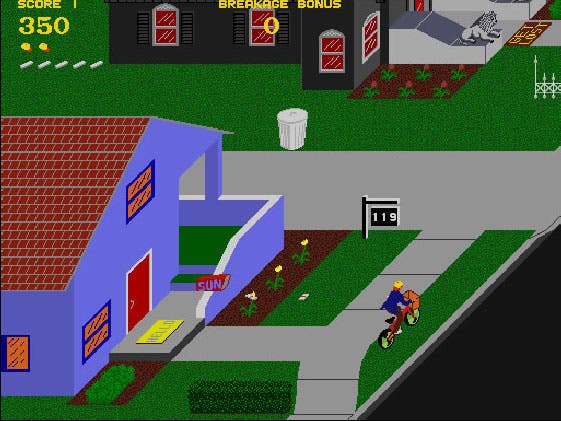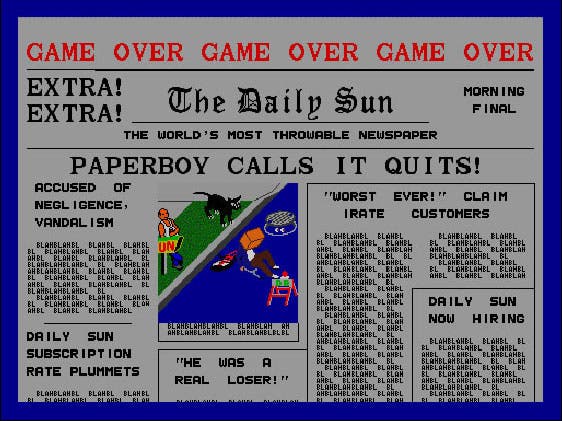Paperboy
Deliverance.
While we await for the new blood to course through the Xbox Live Arcade, yet another of the Midway Arcade Treasures set has received a standalone release - which is either really bad news if you're sick to the back teeth of ancient old crud being fostered upon us, or a chance to relish old school gaming at its purest. 3/10 or 7/10: take your pick.
If, like me, you're in the latter camp, you might be delighted that a genuine all-time arcade favourite has been effectively welcomed into Microsoft's growing hall of fame. Surprisingly, Paperboy stands up pretty well, despite being over 22 years old, and - predictably - rather tough.
At the time, of course, it emerged during an era when arcade manufacturers were starting to get more ambitious with control devices and branching out from the traditional cabinets. Paperboy's central novelty was the use of bicycle handlebars as a means to guide the cap-wearing chap around the deadly suburban streets while you attempted to throw your stock of papers at letter boxes. As a 12 year-old, I recall with rueful clarity that it certainly didn't make it any easier to get around - in all probability, it succeeded in being cool, but not very practical.
Of quarts and pint pots
Of course, like any half decent arcade game it was shovelled lovelessly (mainly by the UK's own shovel-friendly Elite of Commandos, Ghosts n' Goblins and Bomb Jack fame) onto about a dozen different home systems - most which were hopelessly incapable of displaying the colourful, isometric, pin-sharp visuals with any accuracy, never mind the scrolling streets. So, if you're one of the unfortunates who shelled out your pocket money haplessly for those travesties back in 1986, here's a chance to right those wrongs and experience an arcade perfect port in your own home for the price of a large beer.
Alternatively, if you loved the game as much as I did, you many well have already spent years tinkering with MAME trying to make Paperboy run without stuttering - in which case you might have nightmarish flashbacks when greeted with the parping intro music that greets this delightful cartoon romp around American suburbia.

On the 360, Digital Eclipse has delivered the Atari classic in the usual flawless fashion, with a few minor tweaks such as ability to stretch the screen out as you require (yep, even full widescreen if you want) basic score-based versus Xbox Live mode and collaborative (but, again, entirely score-based) Xbox Live co-op mode. In both cases (as with Root Beer Tapper), you simply play the game as you normally would, but see the other players score in the corner of the screen. No big deal, then.
Stopping at nothing to save this land from TV journalism...
In terms of the main game, it's been preserved extremely well on Live Arcade, complete with all those amusing speech samples, and controls that feel responsive and accurate, making it unquestionably a much nicer game to play than it ever felt on my rubbish old Pentium III, Windows 98 MAME set-up. For those who've avoided Paperboy up to now, it couldn't really be much simpler to pick up and play - which makes it a perfect fit for Live Arcade.
The premise of delivering papers in the US, of course, differs wildly to the rest of the world, where physically posting it through a letter box is considered polite. For the purposes of this game, though, that would be pretty boring, so Paperboy ends up being a quirky take on a shoot-'em-up: fire the paper towards your customers (i.e. the letter box or doormat) and try and damage the property of your non-customers by, again, chucking deadly window smashing paper missiles.
But that's not all there is to it. No sir. Your daily journey down Easy Street (or Middle or Hard, if you're really good) also demands that you avoid the hazards that present themselves in front of the average paper boy: reversing cars, fighting neighbours, feisty dogs, demented cats, drunken tramps, doddery old women, runaway tyres, remote controlled cars, and, of course, a swarm of bees. In fact, there are so many hazards that the skill of the game comes from memorising each day of your round. Eventually, you'll reach the so-called 'Training course', which tasks you with reaching the end of a series of ramps and targets in order to grab a score bonus. At the end of each day you lose or gain subscribers based on whether you delivered all your papers correctly, and so it goes on for the entire week, with Sunday being the hardest of all, with heavy papers that can't be thrown as far. As a former Sunday paper delivery boy, I can ruefully testify to that.
Leader of the pack

But even getting that far is likely to require most players an awful lot of repeat play - even on the hilariously inappropriately named Easy Street. High scores are, without doubt, at a premium, which is part of why playing this with the benefit of a worldwide leaderboard has slightly more appeal than usual.
With the usual chunk of hard-to-snag achievements waiting in the wings, you'll probably end up playing Paperboy as much to see what points you can add to your Gamerscore tally as your overall personal best. In that respect, at least, it has a terribly moreish appeal that grows the more you play it, and the more you begin to accept the unreasonable number of hazards thrown at you. Failure isn't too hard to take, though - it's a game that only lasts less than 10 minutes even when you're doing really well. Just one more go is always an option.
That said, the game quickly gets repetitive, and becomes one of those retro games you'll dip into now and then rather than have extensive score-beating sessions on like the best games on Xbox Live Arcade. Most of you might be happy enough getting a retro fix via the free trial, but for the real retro heads out there, it's well worth adding to the digital collection - but only if you were a real fan of it when it first came out.

